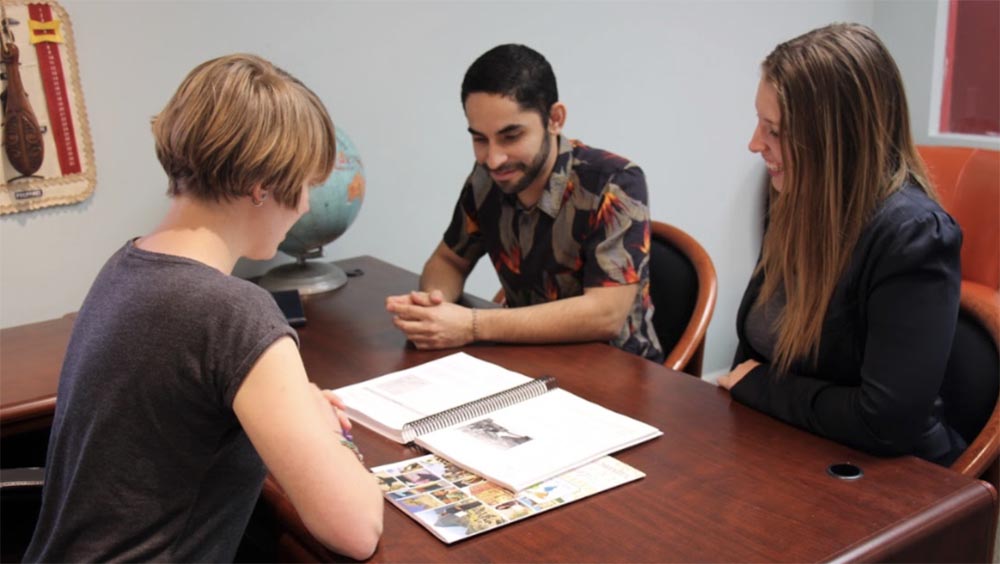TEFL / TESOL / TESL / CELTA / DELTA - What’s The Difference?
Understand the differences between TEFL / TESOL / TESL / CELTA / DELTA, and which one you should take for teaching English abroad.
Written By: Paige Lee | Updated: February 2, 2024
Written By: Paige Lee
Updated: February 2, 2024

So you’ve decided it’s time to research more about the best way to live overseas. Teaching English abroad seems like it could fit the bill, but when you get on Google to look up anything to do with teaching English abroad, you quickly find yourself immersed in a complicated new world of acronyms: TEFL, TESOL, CELTA, ESL, EFL, DELTA and so forth.
Watch Now: TEFL/TESOL/CELTA Differences Explained
Don’t worry, we’ll help you understand the differences between each term, and which one you need to take. First off, let’s clarify what ESL and EFL are and that they’re not certifications in and of themselves:
What does ESL stand for?
ESL is an acronym that stands for English as a Second Language. It usually refers to English language instruction for non-native English students that occurs in countries where English is the dominant or official language. Recent immigrants or foreign exchange students are examples of ESL students.
Read more: What is ESL?
What does EFL stand for?
EFL is an acronym that stands for English as a Foreign Language. While confusingly similar to “ESL”, this term is usually used when referring to English language education in countries where English is not the official language (most of the world). Students in this situation often speak their native language in their daily life and only encounter English in the classroom.
Next, let’s take a look at the most popular certifications and make sense of their acronyms:
Table of Contents
TEFL
The TEFL acronym stands for Teaching English as a Foreign Language.
TEFL is the most popular and common acronym used to refer to teaching English abroad. A “TEFL certification” refers to the training courses and certificates that are commonly required by language schools and institutes around the globe seeking to hire English teachers.
Be aware that “TEFL” does not refer to a singular body, company, certification, or school. It is an industry acronym and there are many TEFL schools, TEFL training programs, and certification options of varying degrees of quality, length and expense.
TESOL
The TESOL acronym stands for Teaching English to Speakers of Other Languages.
In North America, “TESOL” is more typically used when referring to teaching English to non-native speakers in native English-speaking countries such as the U.S. Hence, if you want to earn a Master’s degree for teaching English as a second language in your local public school system, that degree will likely be in TESOL.
It is common for British, Canadian and Australian training centers to issue a certificate in TESOL as that is also used for domestic teaching and regulated by their governments. The U.S. does not have any domestic regulation for teaching English in private language schools and therefore most U.S. and European training would use the term TEFL for teaching abroad.
TEFL vs TESOL: The difference between TEFL and TESOL
TEFL is "Teaching English as a Foreign Language" and TESOL means "Teaching English to Speakers of Other Languages." Both refer to teaching English to non-native speakers. TEFL usually refers to teaching in non-English speaking countries. TESOL often refers to teaching ESL in English-speaking nations.
TESL
The TESL acronym stands for Teaching English as a Second Language.
Just like TEFL, a TESL certification enables you to teach English to non-English speakers. The main difference between TEFL and TESL, however, is where you are actually teaching.
A TESL certificate usually refers to people who plan to teach non-native English speakers living in a native English-speaking country. In other words, you'd seek a TESL qualification if your primary interest is to teach in a country where English is the first language, such as the United States, Canada, The United Kingdom, or Australia.
However, if your primary interest is in traveling and teaching English overseas, then you should seek a TEFL certification.
CELTA
The CELTA acronym stands for Certificate in English Language Teaching to Adults.
CELTA is a specific brand of TEFL certification that is awarded by the University of Cambridge's non-profit assessment organization, Cambridge English Assessment.
The course is offered by a variety of different schools and educational institutions around the globe. It is the equivalent of a 4-week, intensive 120-hour TEFL certification, and trains you to teach English to adults only.
It should be noted that many CELTA providers offer limited (usually local) job placement assistance or none at all. The vast majority are language schools and the CELTA organization does not coordinate with other CELTA schools on assistance. So, each school is on its own about resources for job assistance and placement.
DELTA
The DELTA acronym stands for Diploma in English Language Teaching to Adults.
Similar to CELTA, DELTA is another certification brand awarded by the University of Cambridge's non-profit assessment organization, Cambridge English Assessment.
A DELTA qualification is restrictive in the sense that it is only offered to qualified teachers who already have at least one year of teaching experience. Therefore, DELTA should be only be considered as an option for experienced teachers who are seeking more credentials from Cambridge English Assessment, specifically.
While it may look good on your resume or CV, you do not need a DELTA to teach English overseas.
FAQ's About TEFL / TESOL / TESL / CELTA / DELTA
Is TESOL The Same As TEFL?
When it comes to teaching English abroad, TESOL, like TEFL, is simply an acronym that refers to teaching English to non-native speakers. To a large extent, “TEFL” and “TESOL” are used interchangeably.
Do I Need a CELTA to Teach English Abroad?
The quick answer is no. The vast majority of the hundreds of thousands of TEFL-certified English teachers working around the globe do not possess a CELTA - they have a different brand of TEFL certification.
If you've previously heard or been told that you "need to have a CELTA", this is false. It's the equivalent of someone telling you that you can only earn a recognized college degree from one particular university.
At International TEFL Academy, we certify more than 6,000 students a year who gain an accredited TEFL certification - not a CELTA - and our graduates successfully gain employment in 80 countries worldwide.
Is CELTA Equivalent to TEFL?
CELTA is a brand of TEFL Certification awarded by a specific institution, namely Cambridge English Assessment.
There are many similar brands of TEFL Certification. Trinity, a certification from Trinity University in Ireland is often mentioned in conjunction with CELTA. You may have seen on ESL job boards some schools stating that they “require a CELTA/Trinity or equivalent”, for example.
Just because CELTA is sometimes referenced in job descriptions does not mean it’s the only worthwhile certification. Accreditation & international standards met - not brand - are your most important criteria when looking at which certification course to take.
CELTA vs. TEFL - Which is the Best Certification to Teach English Abroad?
CELTA is certainly a widely recognized and respected type of TEFL certification. However, that doesn't mean it's the best TEFL certification for you. If you're interested in teaching children, for example, a TEFL certification is better since CELTA is specific to adults.
This means that CELTA certifications are quickly becoming outdated and less relevant in many lucrative markets, such as Asia, where youth comprise a majority of the student base.
Additionally, many CELTA providers rely mostly on the reputation of their certification to attract prospective teachers. They offer little or no job search guidance or job placement services once their training has been completed.
It is common for a CELTA school to not spend any time with a prospective student discussing job options or job assistance before registering students. Some CELTA providers offer only local job placement assistance, but it's not worldwide, so if you take your course in Germany and you want to teach in Japan, you will likely be out of luck when it comes to receiving quality job search guidance.
Ask yourself, “Do I want to navigate a vast international job market alone?” If not, a CELTA that does not offer comprehensive job assistance probably isn't for you.
What Is The Difference Between DELTA and CELTA?
CELTA is a brand of TEFL Certification and a TEFL Certification is the qualification you need to teach English abroad. DELTA is a brand qualification awarded by the same organization that awards CELTA. However, DELTA is for people who already have at least one year of experience teaching English as a foreign language to non-native speakers. In other words, you'll likely need a TEFL Certification before you decide to obtain a DELTA.

Which Certification Course(s) do I need?
Ok, now that you know the differences, which one is right for you? Which one you choose may depend on your career goals, budget, whether or not you want to travel, and which country you are most passionate about.
The most important thing is to make sure that you get certified by a highly accredited institution. The acronym on your certification is not critical.
You can take a certification course labeled as TEFL, TESL, TESOL, or CELTA and you will be earning a legitimate qualification IF, and this is critical, the course you take meets certain international standards set forth by the British Council and other leaders in the field, including:
- At least 100 hours of training and coursework (equivalent to a full-time 4-week intensive course)
- At least 6 hours of live practice teaching (practicum) with actual ESL students (not role-playing!)
- The course is taught by experienced university-level instructors (many holding at least an MA in teaching English as a foreign language or linguistics, a DELTA or extensive professional training and English teaching experience)
- The course employs a curriculum that is accredited and externally monitored by independent, credible organizations in the field
There are many great and reputable TEFL certification schools in the world that meet these requirements, and there are many TEFL courses offered (usually at ridiculously cheap prices) that do not meet these standards. While some training is usually better than no training, if you want to receive the professional training you need to teach at a professional level and gain a recognized certification that will qualify you for tens of thousands of jobs worldwide, you need to have an accredited 120-hour TEFL certification course that meets the standards outlined above.
In addition, you want to take your certification course for teaching English abroad from an institution that provides comprehensive job search guidance. This is a critical factor in choosing the right TEFL course, to help you find job opportunities and with matters like interviews, working with recruiters, figuring out visas, and other facets of your job search process.

Ready To Get Started? Learn How to Choose the Right TEFL Course First
There are literally hundreds of schools and institutions that offer any four of the above certifications (and many more) varying in price from $200-$4,000. So how is one supposed to know which certification courses are actually worth time and money?
Here are some tips that will give you the knowledge to make a good decision for your needs:
- In this article, How to Evaluate a TEFL Certification, we’ve laid out for you the extensive details of what a legitimate and quality certification should hold;
- We’ve also outlined What Mistakes to Avoid when conducting your research;
- Make sure you’re getting something that meets the international standards of 100 course hours and 6 hours of live practice teaching with ESL students;
- You also want to make sure that any course is accredited by an international institution, and that you’re going with an organization that has dedicated staff that will assist you in finding work once your training has been completed;
- Do your homework and ask questions. Make sure you research all of your options thoroughly. Call any school that you are considering taking a TEFL class from and speak to a representative:
- Ask them about accreditation and practice teaching. See what sort of job placement assistance they offer and at what cost. You should also ask questions about job markets, hiring seasons and visas;
- If the person on the other end of the phone can't confidently and competently address such matters then you probably shouldn't count on them to provide the training and guidance you need to get a job teaching English abroad.
- Speak to an International TEFL Academy Advisor who will provide you with straightforward and realistic answers and information about TEFL certification and teaching abroad.
So there you have it: English Teaching Acronyms 101 for TEFL Certification. If you have more questions (as you undoubtedly will), make sure you reach out to an International TEFL Academy Advisor.

Going Further: Other ESL-related acronyms
| EAL | English as an Additional Language |
| EL | English Learner |
| ELD | English Language Development |
| ELL | English Language Learner |
| ELT | English Language Teaching |
| ESOL | English to Speakers of Other Languages |
| ESP | English for Special Purposes |
| FEP | Fluent English Proficient |
| FLEP | Former Limited English Proficient |
| LCD | Linguistically and Culturally Diverse |
| LEA | Language Experience Approach |
| LEP | Limited English Proficient |
| LES | Limited English Speaking/Speaker |
| LM | Language Minority |
| L-TEL | Long-Term English Learner |
| NEP | Non-English Proficient |
| NES | Non-English Speaking/Speaker |
| NEST | Native English-Speaking Teacher |
| NNES | Non-Native English Speaker |
| SLL | Second Language Learner |
| TOEFL | Test of English as a Foreign Language |
Posted In: TEFL Certification, Accreditation, Must Read, TEFL Certification Must Read
Paige Lee
Born on a snowy Rocky Mountain-side but raised in the Chicago suburbs, Paige has lived and worked in Shanghai, China where she taught English and explored the Asian continent, as well as the 'Land Down Under' in Australia. With more than 10 years of professional experience in the fields of teaching English abroad & TEFL certification, Paige is one of our most senior Admissions Advisors.
Want to Learn More About Teaching English Abroad & Online?
Request a free brochure or call 773-634-9900 to speak with an expert advisor about all aspects of TEFL certification and teaching English abroad or online, including the hiring process, salaries, visas, TEFL class options, job placement assistance and more.







.jpg)
